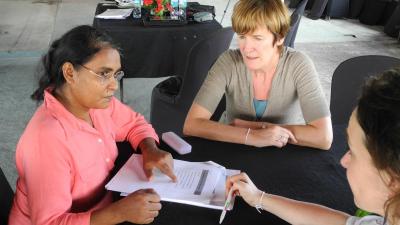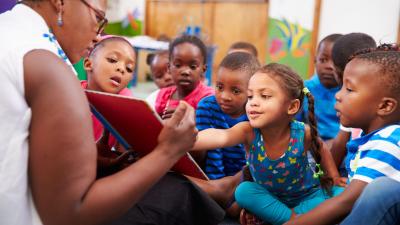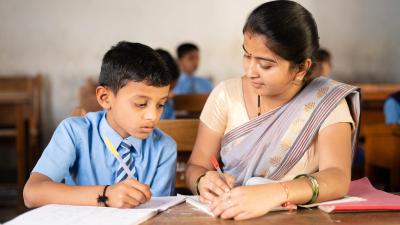Kentalis International Foundation offers guidance and education to professionals working in the field of deaf education, whether in inclusive or special education settings. We work as a knowledge broker or technical advisor with strong local partners across the Global South.
Our approach focuses on creating a holistic system-wide change and fostering a sustainable exchange of knowledge and expertise. We collaborate with international partners, NGOs, universities, governments, and local organizations to achieve our mission.
We work on both:
Train-the-trainer
At Kentalis International Foundation, we follow the train-the-trainer principle to guide our projects. Our aim is to transfer professional expertise in the long term with an agreed exit strategy. What this means in practice is that our experts train a group of professionals from universities, colleges, schools, or NGOs, who then go on to train their colleagues. This approach ensures lasting change.
Kentalis Experts
Our team collaborates with Kentalis experts who have the necessary skills and knowledge to cater to our partner's training requirements. These experts are part of the Kentalis diagnostic centers, schools, care units, and research teams in the Netherlands. Kentalis International Foundation operates in synergy with the Kentalis Academy department to ensure optimal results.
External Funding
At Kentalis International Foundation, we do not provide grants. Instead, we collaborate with partners to identify funding opportunities for our projects. Additionally, we offer short-term projects that are funded by clients who request training or coaching services.
Project Setup
After securing funding and agreeing on a project plan, Kentalis International Foundation will proceed to identify and select experts from Kentalis. These experts will then set up training activities that are tailored to the needs of the partner country. The activities will be implemented in close cooperation with local partners.
Curious to our current work? See the countries we work in and find our latest projects here.

Our Focus
The aim of our work is to strenghten education for children who are deaf and hard of hearing, worldwide. We do this by focusing on these three pillars.
1. Early Childhood Education
Providing inclusive and high-quality education for all learners, including those who are deaf or hard-of-hearing, should begin at the pre-primary level. The early childhood stage, from birth to five years old, is crucial for a child's development. However, many deaf children grow up in environments with limited language exposure, leading to language deprivation during their early years.
Language first
Most deaf and hard-of-hearing children are born into families who can hear. Unfortunately, these parents often lack knowledge on how to communicate effectively with their deaf child. As a result, these children may only start learning sign language when they attend school which can lead to a delay in their reading comprehension. It is crucial for a child to have early and consistent access to language to improve their literacy skills. Kentalis International Foundation is dedicated to sharing the expertise of the Kentalis organization with developing countries to help support deaf and hard-of-hearing children aged 1-5 years old with their language-to-literacy transition.
We focus on:
- Providing expertise to educators, through teacher training colleges and universities, on inclusive early childhood education.
- Encouraging co-enrollment of young deaf children with their peers and being taught together either in one classroom or at the same school.
- Training local Deaf associations on how to support parents and the community in daily life communication with a deaf child at home.
- Improving knowledge of parents and community health workers about hearing loss screening and diagnostics in order to boost early identification.
- Stimulating an enriched language acquisition environment in and outside school, both visual and auditory.

2. Primary Education
When it comes to teaching children how to read, there is no one-size-fits-all approach. While hearing children can use spoken language to develop reading skills, deaf and hard-of-hearing children require a different teaching method. This involves teachers going beyond the standard curriculum and investing time in developing sign language skills before transitioning to reading words and text.
Teaching how to read
For a deaf child, the most easily understandable language is sign language, a visual language that has its own set of grammar rules. This means that in order to learn how to read and write, a deaf child must essentially learn a second language. To provide the best education for these children, a bilingual approach that combines sign language with written language would be ideal. Unfortunately, many deaf children are often unable to receive proper education due to the lack of knowledge and skills of their teachers. Kentalis International Foundation is dedicated to improving the quality of literacy education for deaf and hard-of-hearing children between the ages of 6 and 11 in developing countries by sharing their expertise in teacher education.
We focus on:
- Providing expertise to educators, through teacher training colleges and universities, on how to teach reading and writing to deaf learners.
- Working with the local Deaf community to improve young deaf children’s social engagement and cultural identity.
- Boosting inclusive classrooms, units in schools, and specialized schools for deaf and hard-of-hearing children.
- Supporting remedial teaching or pre-teaching methods to ensure optimal integration of deaf or hard-of-hearing children in regular school settings.
3. Secondary Education
In developing countries, it can be difficult for deaf and hard-of-hearing children to succeed in secondary school. This is often due to teachers not having the necessary skills to teach deaf students, inaccessible learning materials, or classroom layouts that hinder their learning process. However, if educators have the proper tools to create an inclusive educational environment, they can prevent school dropouts and help these students thrive.
Understanding abstract concepts
When it comes to learning, deaf children face different challenges than those who can hear. Unlike hearing children who can rely on their literacy skills and incidental learning experiences, deaf children often have a limited vocabulary and have been isolated in terms of language and communication. To help them understand abstract topics, it's important to use visualization and other teaching methods. Additionally, any barriers, including nonoptimal classrooms and social misconceptions about deafness, should be eliminated. Kentalis International Foundation offers expertise in creating an inclusive secondary school environment for deaf and hard-of-hearing students aged 12-18.
We focus on:
- Providing expertise to educators, through teacher training colleges and universities, on how to visually teach abstract concepts to deaf learners.
- Improving knowledge about the socio-emotional development of a deaf child and tracking progress with educational diagnostics.
- Stimulating engagement with Deaf role models as well as highlighting the role of teachers as bridge-builders for deaf learners.

Do you have questions about our work or would you like to collaborate? Contact us at international@kentalis.nl.